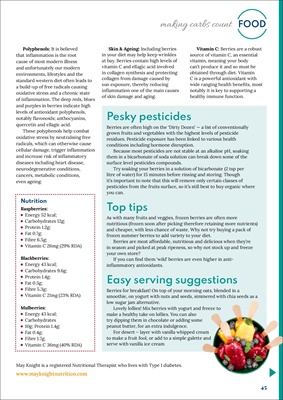
45
FOOD
making carbs count
Nutrition
Raspberries:
Energy 52 kcal;
Carbohydrates 12g;
Protein 1.2g;
Fat 0.7g;
Fibre 6.5g;
Vitamin C 26mg (29% RDA)
Blackberries:
Energy 43 kcal;
Carbohydrates 9.6g;
Protein 1.4g;
Fat 0.5g;
Fibre 5.3g;
Vitamin C 21mg (23% RDA)
Mulberries:
Energy 43 kcal;
Carbohydrates
10g; Protein 1.4g;
Fat 0.4g;
Fibre 1.7g;
Vitamin C 36mg (40% RDA)
Polyphenols: It is believed
that inflammation is the root
cause of most modern illness
and unfortunately our modern
environments, lifestyles and the
standard western diet often leads to
a build-up of free radicals causing
oxidative stress and a chronic state
of inflammation. The deep reds, blues
and purples in berries indicate high
levels of antioxidant polyphenols,
notably flavonoids; anthocyanins,
quercetin and ellagic acid.
These polyphenols help combat
oxidative stress by neutralising free
radicals, which can otherwise cause
cellular damage, trigger inflammation
and increase risk of inflammatory
diseases including heart disease,
neurodegenerative conditions,
cancers, metabolic conditions,
even ageing.
May Knight is a registered Nutritional Therapist who lives with Type 1 diabetes.
www.mayknightnutrition.com
Pesky pesticides
Berries are often high on the 'Dirty Dozen' - a list of conventionally
grown fruits and vegetables with the highest levels of pesticide
residues. Pesticide exposure has been linked to various health
conditions including hormone disruption.
Because most pesticides are not stable at an alkaline pH, soaking
them in a bicarbonate of soda solution can break down some of the
surface level pesticides compounds.
Try soaking your berries in a solution of bicarbonate (2 tsp per
litre of water) for 15 minutes before rinsing and storing. Though
it's important to note that this will remove only certain classes of
pesticides from the fruits surface, so it's still best to buy organic where
you can.
Top tips
As with many fruits and veggies, frozen berries are often more
nutritious (frozen soon after picking therefore retaining more nutrients)
and cheaper, with less chance of waste. Why not try buying a pack of
frozen summer berries to add variety to your diet.
Berries are most affordable, nutritious and delicious when they're
in season and picked at peak ripeness, so why not stock up and freeze
your own store?
If you can find them 'wild' berries are even higher in antiinflammatory
antioxidants.
Easy serving suggestions
Berries for breakfast! On top of your morning oats, blended in a
smoothie, on yogurt with nuts and seeds, simmered with chia seeds as a
low sugar jam alternative.
Lovely lollies! Mix berries with yogurt and freeze to
make a healthy take on lollies. You can also
try dipping them in chocolate or adding some
peanut butter, for an extra indulgence.
For desert - layer with vanilla whipped cream
to make a fruit fool, or add to a simple galette and
serve with vanilla ice cream
Skin & Ageing: Including berries
in your diet may help keep wrinkles
at bay. Berries contain high levels of
vitamin C and ellagic acid involved
in collagen synthesis and protecting
collagen from damage caused by
sun exposure, thereby reducing
inflammation one of the main causes
of skin damage and aging.
Vitamin C: Berries are a robust
source of vitamin C, an essential
vitamin, meaning your body
can't produce it and so must be
obtained through diet. Vitamin
C is a powerful antioxidant with
wide ranging health benefits, most
notably it is key to supporting a
healthy immune function.